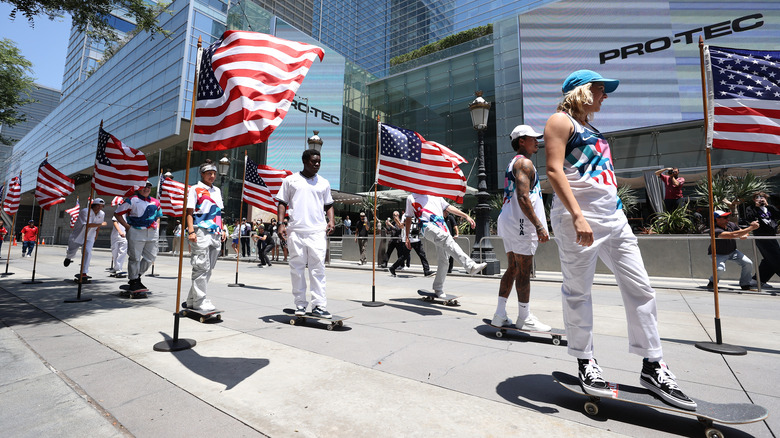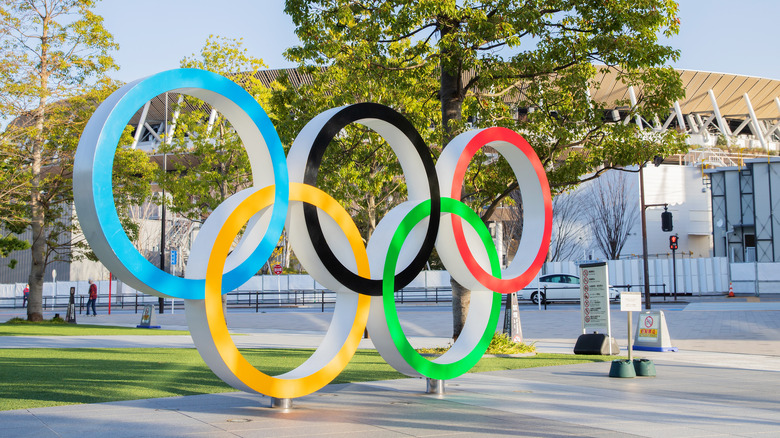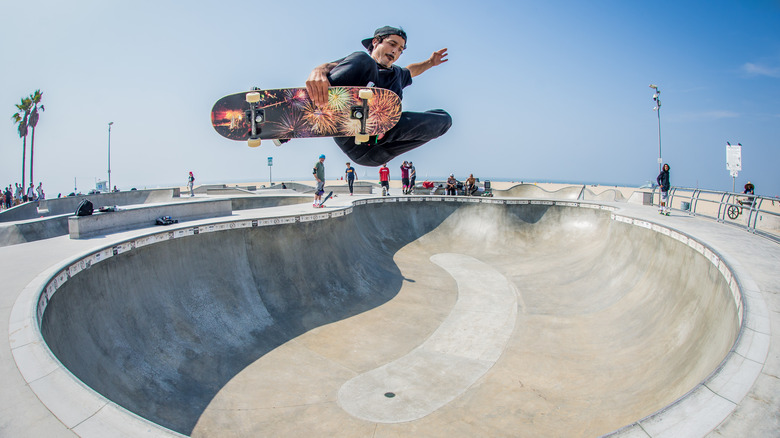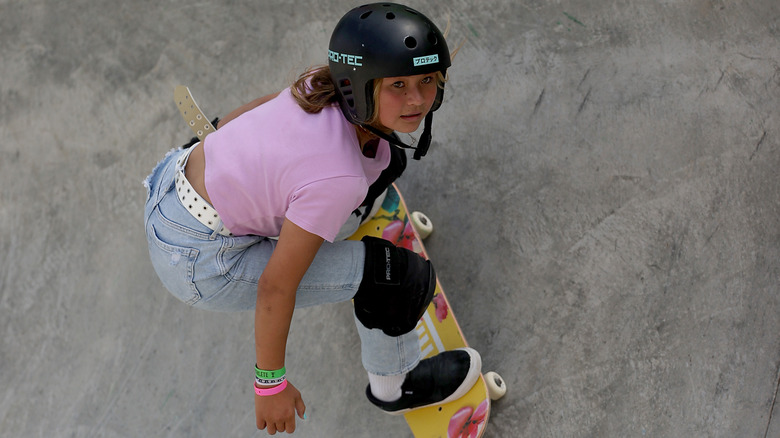Olympic Skateboarding: Everything You Need To Know Before Watching
The Olympics have changed quite a bit from the old root traditions practice in Greece as a way to honor the lightning-slinger Zeus to the modern iteration of the games born out of the late 19th century. Even the modern games of today would barely be recognizable to those at the turn of the 20th century. New sports have been added; more countries than ever have joined the contest; the total number of competitors has increased beyond imagination. And with all of these changes, as they roll around every four years, the Olympics tend to reflect the world's growth. Arguably, no change has embodied the contemporary state of the world as much as one of the most recent additions to the Olympic games: skateboarding.
According to LiveAbout, skateboarding first showed up sometime in the '50s when a bunch of surfers decided to turn pavement into the landlocked equivalent of "tubular waves, dude." From there, skateboarding grew through the decades, becoming a major sport with the creation of the X Games in Rhode Island in 1995, held by ESPN. At this point in time, most young people have ridden a skateboard, and the sport has become an entire subculture of its own. But what's skateboarding look like as an Olympic event?
Debuts in the 2021 Olympics
Even though skateboarding has been around for a while, it wasn't until the 2020 games, which were postponed to 2021 due to the COVID-19 pandemic, that the sport was added to the schedule of events by the International Olympic Committee. As Forbes points out, skateboarding isn't the only new Olympic sport you can expect to see this year either. We'll see Olympic karate for the first time, as well as sport climbing and surfing. The games have also added new events within sports they've been running for a while, such as three-on-three basketball and freestyle BMX. If nothing else, this summer's Tokyo Olympic games are sure to draw in a younger, and some might argue a "hipper," audience.
The inclusion of skateboarding is something that probably should've happened sometime before now. According to Skate Review, the sport has been on a bit of a downtrend in recent years. It's still considered one of the top global sports, however, so we're glad the Olympics got to it late rather than never.
Making it an Olympic sport has gotten mixed reviews
The image that comes to mind when many of us think about skateboarding isn't a sterile one. We picture the girl with green hair and ripped jeans grinding her trucks down the stairway rail leading to her local university. We see the punk kids fleeing from cops on their boards after tagging the anarchy "A" in an alley. Basically, skateboarding has lived most of its life in counterculture and defiant subculture areas of society, something that might be lost with the sport joining the Olympics.
The ripped jeans, patched clothes, and sticker-covered helmets common at skate spots are being replaced with tidy Olympic uniforms, and, according to NBC, even members of the Olympic team feel this sort of shift may damage the essence of skateboarding. A huge part of the draw of skateboarding has always been the lack of governing bodies and the freedom of self-expression. The publisher of Jenkem Magazine explained to NBC that the skateboarding community is scared this move may ruin the more artistic nature of the activity. Since the sport is lined up to continue through at least the 2024 Olympics, time will be the only thing to show us where skateboarding is going from here.
Park vs. Street competitions
In the world of skateboarding exists two sides to the same deck — two distinct types of skating. These are "vert" and "street," and, as the official Olympics website explains, they will be separate events in the Tokyo Olympics. Disclaimer: "Vert" is both a broad category that includes park skating and a more specific one used to describe skating a really big half-pipe.
For the vert competition, which the Olympics calls the "park" event, skaters will be tearing up a hollowed-out, contained park, commonly known as a "bowl." This is all that high-flying action that skating legends like Tony Hawk were known for. The big tricks, the spinning grabs, the nose stalls, and the famed 900: That's the sort of stuff you'll probably be seeing during the Olympics' park event.
The street event embodies the type of skating all the hoodlums know best. It takes place on a more flat course filled with stairs and rails and bumps and small ramps so skaters can do the grinds and flip tricks that were birthed in communities without access to fancy skate parks. The tricks you'll see here won't get as much air or take as many rotations as the stuff you'll see in the park competition, but they'll be equally as complicated and take a whole lot of finesse and balance to pull off.
What scoring will look like
Since the skateboarding competition consists of two different events, the scoring is a bit different, too, but not as much as you'd think. The Olympics' skateboarding webpage breaks it down pretty well.
The park skate will involve prelims which will determine which skaters get to move on to the finals. There will be 20 skaters in the prelims, who will run in four heats of five skaters each. The top eight scorers will advance to the finals where they'll each be given three 45-second runs per round that will be judged on a 100-point scale in much the same way as the newer X Games scoring system. The top and bottom scores from the five judges will be tossed out each round, and the middle scores will be averaged to give a final score.
The street competition will also have prelims of 20 skaters running four heats of five skaters followed by finals of eight. The scoring system in the street event is more of the old-school X Games scoring system, using a 0-10 point structure. The finals will run two 45-second runs per round allowing for five tricks each run. Again, only the middle scores from the judges will be kept each round and averaged into a final score.
Some of the participants are shockingly young
Skateboarding has always been a young persons' game. Sure, there are professionals out there in their late 20s and 30s, and some so old we're surprised they're not breaking hips on the halfpipe, but if you look at the majority of skaters pushing decks, those who can't legally buy a beer have the highest numbers. At least that's what Skate Review's statistics say, and you'll see this in action if you stop down at your local skatepark. Those wiry frames and the fearlessness of youth probably have a lot to do with it.
The sport being a young persons' game is clearly shown in the athletes who qualified to compete at the Olympic level. For the United States Olympic teams, as The New York Times notes, we have Bryce Wettstein as a prime example: a 17-year-old high schooler who will be competing in the park competition as the top-ranked American female competitor. But there's an even more shocking participant from across the pond.
For Britain, there's Sky Brown. Brown is a serious champ, making her Olympic debut at the age of 12. That's one year older than Britain's youngest Olympian ever, according to Inside the Games. Besides being the youngest Olympic skater, Brown is the world's youngest professional skateboarder. Watching her and Wettstein tear it up will be an inspiring moment for all the aspiring young athletes everywhere.
This year's Olympic Games are scheduled for July 23-August 8.





